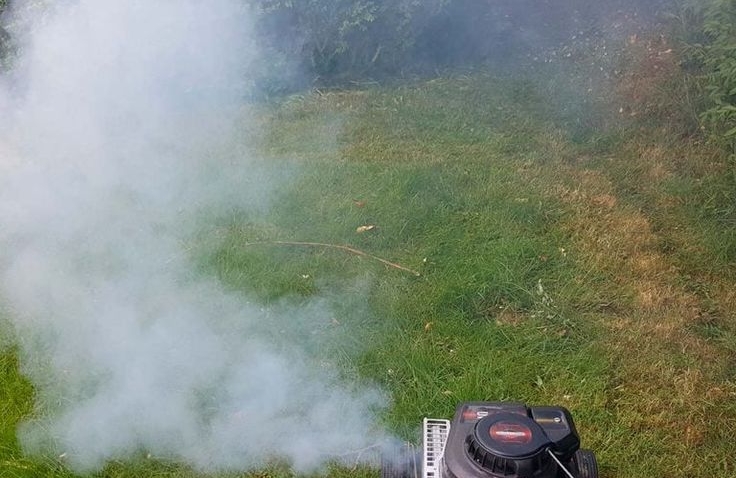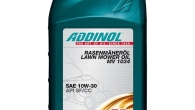
Why Does My Lawnmower Smoke: Troubleshooting
Introduction
If you’ve ever been in the middle of mowing your lawn, only to notice a plume of smoke rising from your trusty lawnmower, you’re not alone. A smoking lawnmower can be a frustrating and concerning issue. But don’t worry; this article will guide you through the common reasons why your lawnmower might be smoking and provide you with practical solutions to address the problem. Whether it’s black, blue, or white smoke, we’ll help you identify the cause and offer step-by-step instructions to fix it.
Understanding the Types of Smoke
Why does my lawnmower smoke? Before diving into the specific causes and solutions, it’s important to understand the different types of smoke that your lawnmower might emit. The color of the smoke can give you valuable clues about what might be wrong. Here are the three main types of smoke and what they typically indicate:
Black Smoke: This is usually a sign of an overly rich fuel mixture, which means there’s too much fuel and not enough air. It could also indicate a dirty air filter or a clogged carburetor.
Blue Smoke: Blue smoke is often a sign of burning oil. This can happen if the oil level is too high, or if there’s an issue with the engine seals or piston rings.
White Smoke: White smoke usually indicates that water or moisture has entered the combustion chamber. This could be due to condensation, a leaky head gasket, or even using the wrong type of fuel.
Causes of White or Blue Lawnmower Smoke
Experiencing white or blue smoke from your lawnmower can be alarming. However, these colors often point to issues related to the engine’s oil. Understanding these causes can help you fix the problem swiftly and prevent potential damage.

Oil Spills on the Engine
If you notice white or blue smoke, an oil spill could be to blame. This can happen during oil changes or if your mower tilts too much. The spilled oil burns off, producing smoke. Simply let the mower run for a short time; the oil will burn away, and the smoke should stop.
Overfilled Oil Reservoir
Too much oil can also lead to white or blue smoke. Check your oil with a dipstick; if it’s above the fill line, drain some oil out. Refill carefully, monitoring the level to prevent overfilling again.
Using the Wrong Grade of Oil
Using incorrect oil can cause smoking issues too. Ensure you’re using the recommended oil type for your lawnmower. Check the owner’s manual to find the right oil for your machine and replace it if necessary.
Black Smoke and Fuel Issues
When you notice black smoke, it’s often related to fuel problems in your lawnmower.
Understanding ‘Running Rich’
Your lawnmower might be ‘running rich.’ This means it’s using too much gas. This happens when the air-to-fuel ratio isn’t right. It needs fixing to stop the black smoke.
How a Dirty Air Filter Affects Your Lawnmower
A clogged air filter can cause this issue. It blocks air, making the fuel mix too rich. A simple fix is to replace the air filter. Check your manual to see which filter you need.
Adjusting the Carburetor for Better Airflow
The carburetor manages how much air mixes with the gas. If you still see smoke after cleaning the filter, it might need adjustment. You can either try it yourself using the manual or consult a professional if you’re unsure.
When to Seek Professional Lawnmower Repair
Despite your best efforts at home, there are situations when professional help is the wisest option. Be mindful of these signs that indicate a deeper problem with your lawnmower.
Persistent Blue or White Smoke Issues
If blue or white smoke continues after you’ve addressed oil spills and reservoir levels, it’s time to consult a pro. Persistent smoke could signal a serious engine problem, like a faulty crankshaft seal or worn engine components. Don’t let the issue linger as it might cause long-term damage.
Ongoing Black Smoke After DIY Fixes
Should black smoke persist even after cleaning or replacing the air filter and adjusting the carburetor, get help. These symptoms may reveal a more complex fuel system malfunction that needs expert attention.
Warranty and Repair Services Considerations
Check if your lawnmower is under warranty. Repairs might be covered by the manufacturer. If not, a reputable repair service will be needed. Always ask about the cost of repair services upfront to avoid surprises.
Common FAQ About Lawnmower Smoke
Understanding why your lawnmower is emitting smoke is crucial in preventing future issues. Let’s address some common questions.
Can Low Oil Cause White Lawnmower Smoke?
Yes, low oil can be a culprit. A mower with little oil may release white smoke. Check oil levels to confirm this.

Does a Dirty Air Filter Cause White Smoke?
No, it causes black smoke. A dirty filter restricts air, resulting in a rich fuel mix. Change the filter to fix this.
Misconceptions About Blown Head Gaskets
White smoke does not always mean a blown gasket. It often points to oil problems. Check the oil before jumping to conclusions.
Evaluating the Amount of White Smoke
Any white smoke from a mower is unusual. It suggests there’s an issue to fix. Address it swiftly to avoid harm to your machine.
Preventive Measures and Maintenance Tips
Regular upkeep can prevent your lawnmower from producing smoke. Follow these tips to keep your mower in good condition.
Regular Checkup of Oil Level
Check your mower’s oil level frequently. Use the dipstick to do this properly. This helps avoid problems like white smoke. Ensure you don’t overfill the reservoir. Stick to the ‘fill’ line.
Importance of Cleaning or Replacing Air Filters
A dirty air filter can cause black smoke. Check the filter often. Clean or replace it as needed. This will help keep the air-to-fuel ratio balanced and prevent fuel issues.
Proper Lawnmower Handling and Maintenance
Handle your mower correctly to avoid oil spills. Don’t tip it too far, and always follow the manual’s maintenance guide. Regular maintenance can stop smoke issues before they start. Keep your mower clean and in line with the manufacturer’s recommendations.
Final Recommendations Before Calling a Pro
Facing lawnmower smoke can be daunting, yet certain steps can curb further issues. Here are final tips prior to seeking expert help.
Steps to Take After Noticing Smoke
If you spot smoke, act promptly. Cease mowing and switch off the engine. Let the mower cool down. Inspect for oil leaks or spills. Check if the oil reservoir is overfilled. Assess the air filter- it might be clogged. Peek at the owner’s manual for troubleshooting tips. Execute simple fixes like cleaning the air filter. Try restarting the lawnmower to see if the issue persists.
When to Immediately Shut Off Your Lawnmower
Safety first- if there’s smoke, shut it off immediately. Notice dense smoke or oil odor? Turn off the mower right away. Is there an abnormal noise coming from the engine? This is a shut off sign. See flames or excessive heat? Don’t delay, switch off instantly.

DIY Checklist Before Consulting a Professional
Before considering a repair expert, go through this checklist. Confirm the oil type and level match guidelines. Replace the air filter if it’s filthy. Adjust the carburetor as illustrated in the manual. Check if the smoke stops after these DIY solutions. If problems last, note the smoke color and behavior. Gather the mower model details and the recent changes made. Have this information ready if a pro’s help ends up required.
Conclusion
A smoking lawnmower can be a frustrating problem, but with the right knowledge and tools, you can often resolve the issue on your own. By understanding the different types of smoke and their causes, you can quickly identify the problem and take the appropriate steps to fix it. Remember to perform regular maintenance to keep your lawnmower in top condition and avoid future issues. If the problem persists, don’t hesitate to seek professional help. With these tips, you’ll be back to mowing your lawn without a hitch in no time!












Leave a Reply